Unit 4 I used to be afraid of the dark.(大单元教材分析)教学课件-人教新目标九年级英语全册
文档属性
| 名称 | Unit 4 I used to be afraid of the dark.(大单元教材分析)教学课件-人教新目标九年级英语全册 | 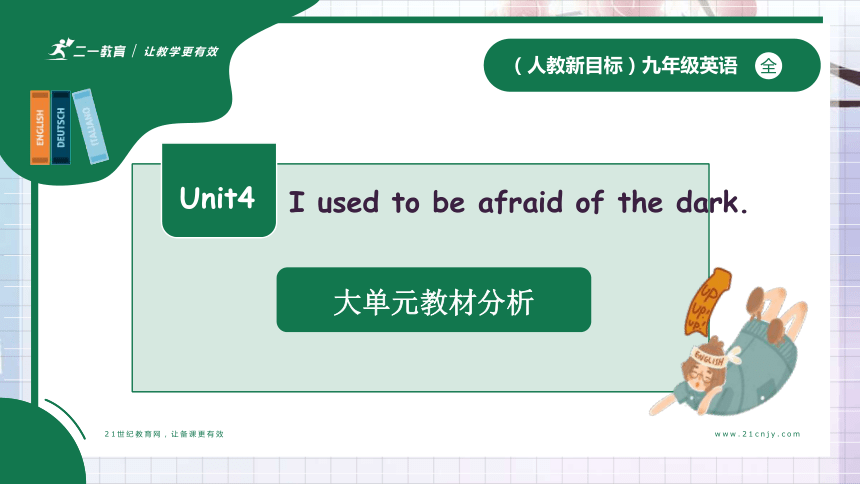 | |
| 格式 | pptx | ||
| 文件大小 | 60.3MB | ||
| 资源类型 | 试卷 | ||
| 版本资源 | 人教新目标(Go for it)版 | ||
| 科目 | 英语 | ||
| 更新时间 | 2025-06-16 11:13:30 | ||
图片预览

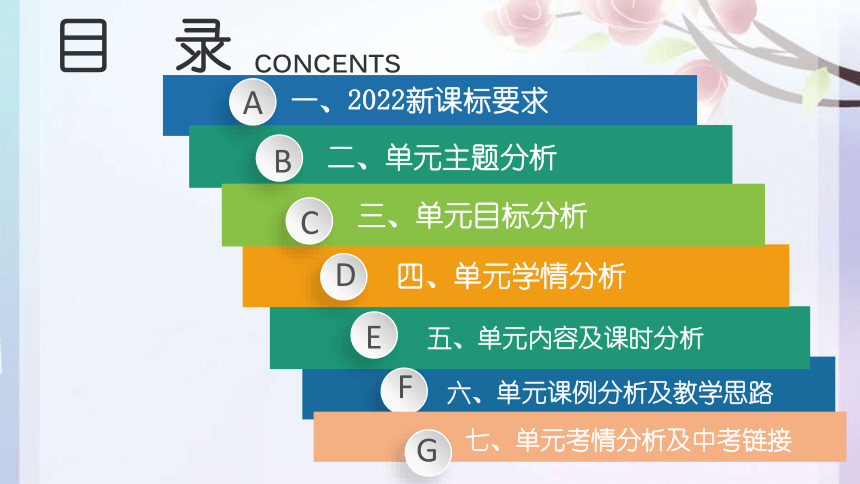
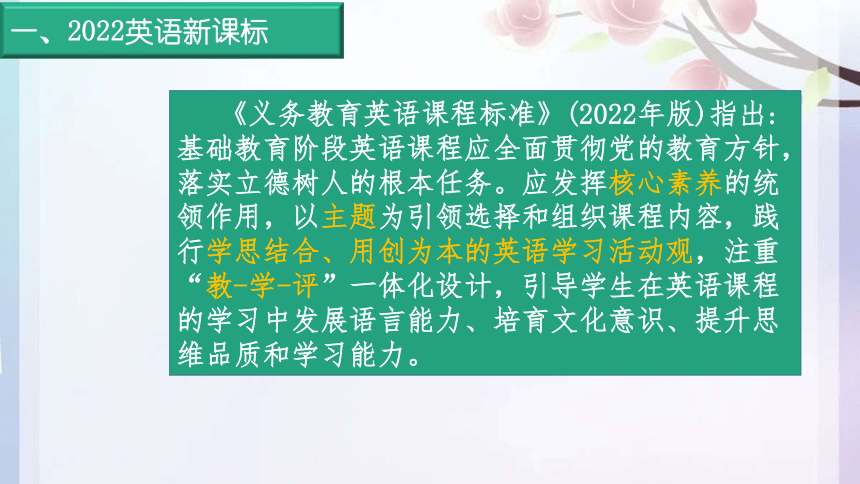
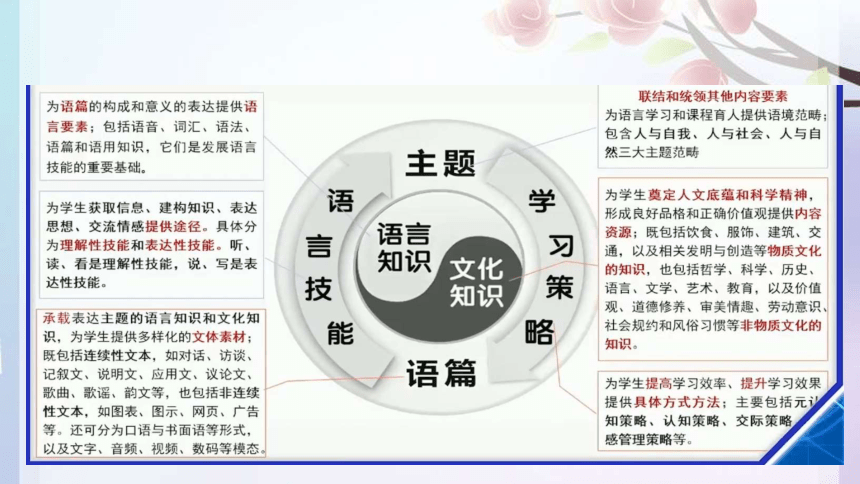
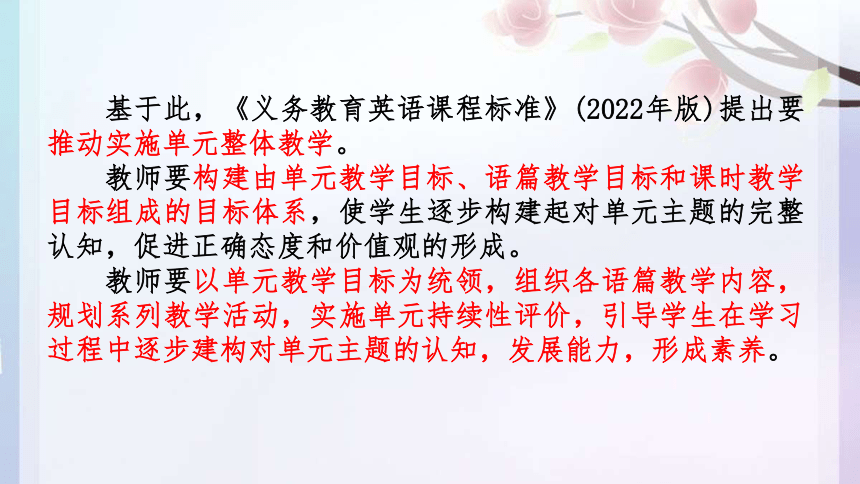
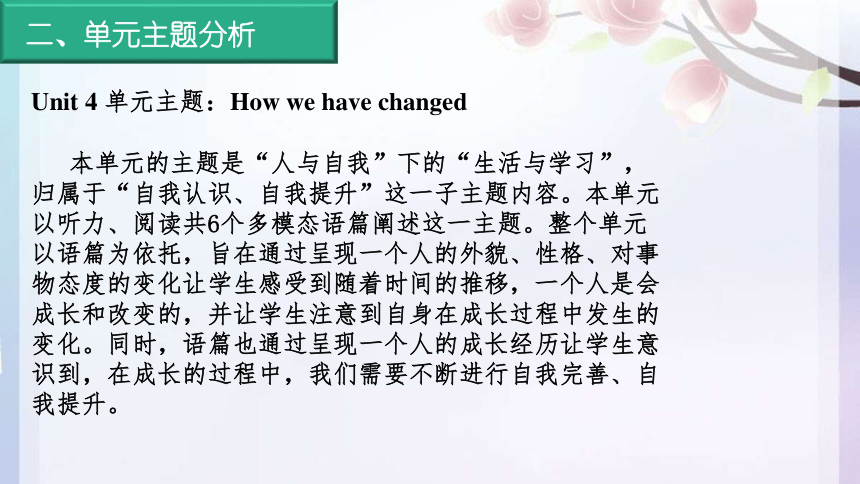


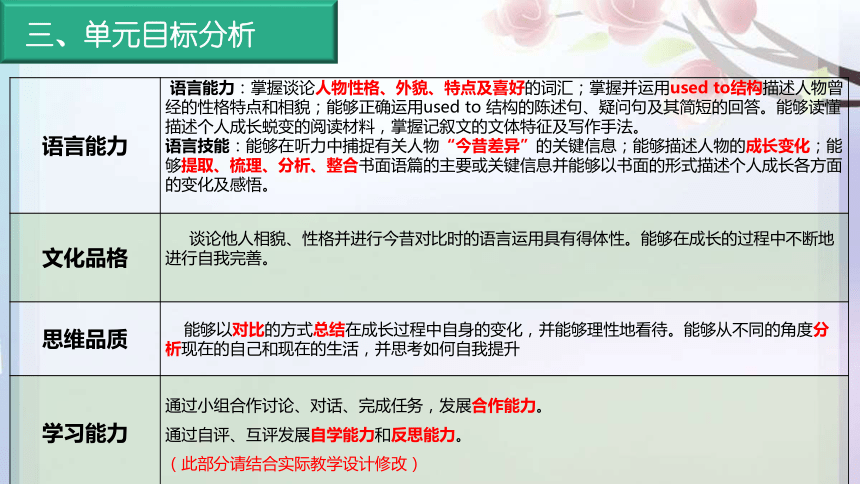

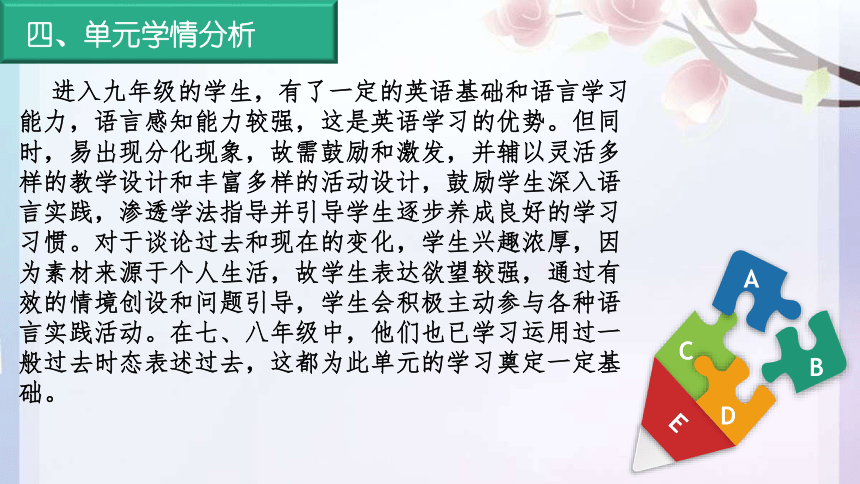
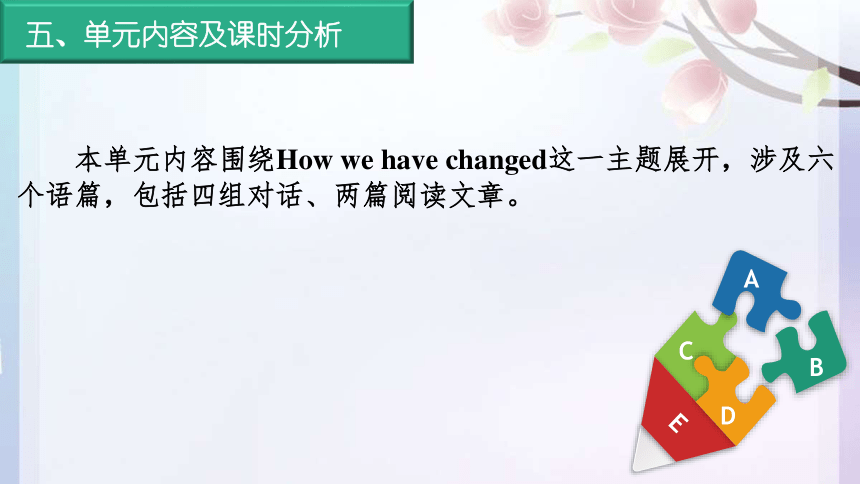
文档简介
(共60张PPT)
(人教新目标)九年级英语
全
大单元教材分析
I used to be afraid of the dark.
Unit4
A
一、2022新课标要求
二、单元主题分析
三、单元目标分析
四、单元学情分析
B
C
D
CONCENTS
目 录
E
F
五、单元内容及课时分析
G
七、单元考情分析及中考链接
六、单元课例分析及教学思路
《义务教育英语课程标准》(2022年版)指出:基础教育阶段英语课程应全面贯彻党的教育方针,落实立德树人的根本任务。应发挥核心素养的统领作用,以主题为引领选择和组织课程内容,践行学思结合、用创为本的英语学习活动观,注重“教-学-评”一体化设计,引导学生在英语课程的学习中发展语言能力、培育文化意识、提升思维品质和学习能力。
一、2022英语新课标
基于此,《义务教育英语课程标准》(2022年版)提出要推动实施单元整体教学。
教师要构建由单元教学目标、语篇教学目标和课时教学目标组成的目标体系,使学生逐步构建起对单元主题的完整认知,促进正确态度和价值观的形成。
教师要以单元教学目标为统领,组织各语篇教学内容,规划系列教学活动,实施单元持续性评价,引导学生在学习过程中逐步建构对单元主题的认知,发展能力,形成素养。
二、单元主题分析
Unit 4 单元主题:How we have changed
本单元的主题是“人与自我”下的“生活与学习”,归属于“自我认识、自我提升”这一子主题内容。本单元以听力、阅读共6个多模态语篇阐述这一主题。整个单元以语篇为依托,旨在通过呈现一个人的外貌、性格、对事物态度的变化让学生感受到随着时间的推移,一个人是会成长和改变的,并让学生注意到自身在成长过程中发生的变化。同时,语篇也通过呈现一个人的成长经历让学生意识到,在成长的过程中,我们需要不断进行自我完善、自我提升。
话题 主题 范畴 主题群 子主题内容 主题 主题意义
I used to be afraid of the dark. 人与自我 生活与学习 自我认识,自我提升 正视成长变化,不断自我完善 让学生注意到自身在成长过程中发生的变化。同时让学生意识到,在成长的过程中,我们需要不断进行自我完善、自我提升。
Unit 4 I used to be afraid of the dark.
一个人的自我成长经历
Section A 1b: 一个人外貌的变化
Section A 2a-2b:一个人性格的变化
Section A 2d: 一个人外貌+性格的变化
Section B 1c-1d: 男孩和女孩回忆上小学的经历,并和高中生活作对比
Section A 3a:19岁的女孩Candy Wang从一个害羞的女孩成长为流行歌手的故事
Section B 2b: 15岁的农村男孩Li Wen的成长故事
通过谈论过去,意识到自身发生的变化,明白自我完善的重要性
成长过程中一个人外貌和性格的变化
成长过程中一个人对事物态度的变化
二、单元整体教学设计
语言能力 语言能力:掌握谈论人物性格、外貌、特点及喜好的词汇;掌握并运用used to结构描述人物曾经的性格特点和相貌;能够正确运用used to 结构的陈述句、疑问句及其简短的回答。能够读懂描述个人成长蜕变的阅读材料,掌握记叙文的文体特征及写作手法。
语言技能:能够在听力中捕捉有关人物“今昔差异”的关键信息;能够描述人物的成长变化;能够提取、梳理、分析、整合书面语篇的主要或关键信息并能够以书面的形式描述个人成长各方面的变化及感悟。
文化品格 谈论他人相貌、性格并进行今昔对比时的语言运用具有得体性。能够在成长的过程中不断地进行自我完善。
思维品质 能够以对比的方式总结在成长过程中自身的变化,并能够理性地看待。能够从不同的角度分析现在的自己和现在的生活,并思考如何自我提升
学习能力 通过小组合作讨论、对话、完成任务,发展合作能力。
通过自评、互评发展自学能力和反思能力。
(此部分请结合实际教学设计修改)
三、单元目标分析
学科核心素养与课标分析:
本单元融入大量含used to结构的语句,由于教学内容与学生的实际生活密切相关,易于激发学生学习兴趣。通过观察图片、听说训练、阅读理解等训练方式和独立学习、合作交流、完成任务等形式完成目标语言的输入,让学生在感受、理解、体验的基础上,很容易就能掌握这个结构。并能运用used to 结构谈论自己与过去的不同,准确地描述人物过得外貌、性格和心理特征。通过学习,让学生在交际活动中,学会正确地用英语谈论事物的发展和变化,明白事物是在不断发展变化的,培养学生积极向上的健康心态。
二、单元整体教学设计
A
B
C
D
E
进入九年级的学生,有了一定的英语基础和语言学习能力,语言感知能力较强,这是英语学习的优势。但同时,易出现分化现象,故需鼓励和激发,并辅以灵活多样的教学设计和丰富多样的活动设计,鼓励学生深入语言实践,渗透学法指导并引导学生逐步养成良好的学习习惯。对于谈论过去和现在的变化,学生兴趣浓厚,因为素材来源于个人生活,故学生表达欲望较强,通过有效的情境创设和问题引导,学生会积极主动参与各种语言实践活动。在七、八年级中,他们也已学习运用过一般过去时态表述过去,这都为此单元的学习奠定一定基础。
四、单元学情分析
二、单元整体教学设计
A
B
C
D
E
本单元内容围绕How we have changed这一主题展开,涉及六个语篇,包括四组对话、两篇阅读文章。
五、单元内容及课时分析
单元课时分析
Period 1
SectionA 1a-2c
Period 2
SectionA 2d&GF
Period 3
Section A 3a-3c
Period 4
Section B 1a-1e
Period 5
Section B 2a-2f
Period 6
Section B 3a-Self Check
Unit 4
I used to be afraid of
the dark.
[What]
该听力材料包含三段对话,均为好久不见的同学再次见面,感叹对方外貌上的变化。
[Why]
让学生关注到成长给人带来的外貌上的改变。
[How]
三段听力材料通过对比的手法呈现了主人公在外貌上的变化。在描述主人公过去的样貌时,对话使用了used to结构:you used to be short; you used to wear glasses; you used to have short hair; you used to be really tall; it (hair) used to be red and curly.
在描述主人公现在的样貌时使用了一般现在时:Now, I’m tall. / You’re taller than me now. / And it’s (hair) straight.
同时,对话还复习用于描述外貌的形容词:short, tall, blonde, straight, curly.
语篇一
[What]
Paula和Steve是初中同学,两人再次见面,Steve惊讶于Paula性格上的改变。Paula曾经十分内向,现在却开朗活泼。
[Why]
引导学生关注到,在成长过程中除了外貌,一个人的性格也会发生变化。
[How]
这段对话主要使用一般过去时描述Paula曾经的性格特点:were always silent in class; wasn’t very outgoing; were always friendly。在展现性格变化时,Paula通过“举例子”让自己的性格反差表现得更强烈。例如,她形容以前的自己是:was never brave enough to ask the teachers any questions。现在的Paula十分活跃,例如:more interested in sports; play soccer almost every day; on a swim team。 这些事例可以让人更深刻地感受到Paula的变化,也让对话更饱满。
此外,这段对话还复习了描述人物性格特征的形容词:quiet, silent, brave, friendly, active。
语篇二
[What]
Alfred和Gina去参加同学聚会,他们发现三年不见,小学同学Billy无论是外貌还是性格都发生了巨大的变化。
[Why]
通过阅读,学生能够从外貌和性格两方面描述一个人的变化,同时能够思考为什么一个人会发生这样的变化。
[How]
对话从外貌和性格两方面谈论了Billy的变化。对话用used to结构+一般过去时描述了过去Billy的样貌和性格:used to be thin and wear glasses; used to be shy and quiet; face always turned red when talked to girls; reading in the library every day。对话用一般现在时描述了Billy现在的样貌和性格:big and strong; so popular; lots of girls around him。
这段对话是对Section A 1b及2a-2b语言点的综合运用。
语篇三
[What]
本文为阅读文本From Shy Girl to Pop Star,记录了作者对19岁亚洲流行歌手Candy Wang的采访经历,讲述了Candy Wang成名前后生活的变化以及她给“想成名”的年轻人的建议。
[Why]
激励学生在成长的道路上不断完善自我、提升自我。同时,也让学生意识到自我提升的过程充满了艰辛和困难。
[How]
本文是一篇记叙文,共包含3个段落,按照顺序式结构展开,每一段的中心思想非常明确,且有明显的主题句。
第一段简述了Candy学唱歌的原因:She used to be shy and took up singing to deal with her shyness. 和学唱歌对她的改变:She’s not shy anymore and love singing in front of crowds.
语篇四
[How]
第二段描写了Candy成名前后生活的变化。成名前:She didn’t use to be popular in school; 成名后:travel and meet new people all the time; get tons of attention everywhere she goes。成名让她享受瞩目的同时也让她承受压力:always has to worry about how she appears to others; have to be very careful about what she says or does; doesn’t have much private time; impossible to hang out with friends。
第三段叙述了Candy给想要成名的年轻人的建议,让人们看到成名的路上布满了荆棘和挑战。追求成功的人很多,但是最终能站在顶峰的人只是少数,因此成功意味着付出和牺牲:have to be prepared to give up your normal life; can never imagine how difficult the road to success is; thought about giving up but still fought on; really require a lot of talent and hard work to succeed.
文章运用“对比”的手法让读者清晰地看到了Candy的成长变化。在描写Candy的成功之路时,文章运用了被动语态 (you have to be prepared to give up)和表示频次
[What]
男孩和女孩回忆他们上小学的经历。
[Why]
引导学生回忆过去的经历,并让学生感受到,随着时间的推移,一个人在对待事物态度上会发生变化。
[How]
对话展现了交谈双方对小学和高中生活截然不同的态度。女孩like high school more than primary school,因为:she didn’t use to like test; used to be very nervous about tests; used to have to wear the school uniform; hate P.E. class。而到了高中:she doesn’t worry about tests; can wear whatever she likes。但是从男生的谈话中,我们可以推测出他对小学生活更为怀念,因为:school was really easy,表现为:tests in primary school were easy; used to play every day after school; don’t like thinking about what to wear every day。而高中的生活是:just study all the time。
对话依然使用used to结构、一般过去时、一般现在时描述过去和现在的生活。
语篇五
[How]
从对话可以看出,女孩不太喜欢上小学的经历是因为那个时候她不太适应考试。而现在她对考试的态度是有变化的:从used to be very nervous到don’t worry about tests。男孩对体育课的态度也有变化,从:used to hate P.E.转变为love it。
对话依然使用used to结构、一般过去时、一般现在时描述过去和现在的生活。
[What]
15岁的农村男孩Li Wen在父母进城务工后性格变得敏感内向,对学习也失去了兴趣。经老师沟通,Li Wen的父母从外地赶回,帮他解开心结,Li Wen又逐渐变得开朗、乐观,也再次感受到了父母的关爱。
[Why]
通过讲述Li Wen的变化让人们意识到父母在孩子成长过程中发挥的重要作用。同时,也引导学生思考应该如何处理与父母之间的关系,应当如何体谅父母。
[How]
本文为阅读语篇He Studies Harder Than He Used to,文体为记叙文。本文有非常明显的记叙文六要素:
Who: Li Wen, his teacher, his parents
Where: a boarding school in the countryside
When: before and after his parents went to work in the city
What: the changes of his life and his performance in school
Why: his parents worked in the city; he felt lonely and
unhappy
How: 1. Li Wen changed for the better
语篇六
[How]
2. his parents spent more time on him and had much more communication with him
本文的写作逻辑可以按照两个维度划分:
时间顺序,展现了Li Wen由“好——变坏——变好”的过程:
父母进城务工前Li Wen的生活状态(works very hard and does well in school; his family spent a lot of time together)
父母进城务工后Li Wen在学校的表现 (became less interested in studying; sometimes absent from classes and failed his examinations; shy and was not able to make friends quickly in school)
父母返乡和Li Wen交谈后Li Wen的变化 (become more outgoing; made some good friends; joined the school basketball team; become more outgoing in many other activities; much happier and work harder than he used to)
本文还可以按照因果关系整理逻辑关系,找到导致Li Wen行为变化的原因。
二、单元整体教学设计
A
B
C
D
E
在本单元中,Section A部分通过观察人物变化,让学生学习used to语句结构并学会描述外貌、性格和心理特征;Section B部分在话题、词汇、语言结构和语言技能基础上都有所拓展,话题上扩展到描述及谈论度假的感受;语言除进一步综合训练、巩固A部分内容外,学习正确、得体地运用相关结构描绘变化,表达成为重要任务;在语言技能上,则由听、说转向综合性地听、读、写的训练。
以阅读课第四课时为例
Section B (2a-2f)
六、单元课例分析
He Studies Harder Than He Used to
Unit 4
Section B (2a-2f)
01
02
03
To master the key words and phrases: influence, seldom, be proud of, absent, fail, boarding school, in person, take pride in…
To use the sentence context to find the missing sentences and guess the meanings of new words.
To understand parents more and care about left-behind children.
Learning Objectives
Who are they
left-behind children
personalities
feelings
problems
miss parents
feel lonely
unhappy
shy
quiet
...
have little interest in studying
do too much housework and farm work
lose themselves in mobile phone games
fight/smoke/…
Prediction
Li Wen is a 15-year-old boy from the countryside. His parents are working in the city. Look at the title of the passage and the picture below. What problems do you think he might have
2a
Li Wen
He is a left-behind child.
miss his parents
feel lonely
have no interest
in studying
In the past
Now
Title: He Studies Harder than He Used to
Now he studies harder.
He didn’t use to study hard.
How
Why
Change
(Tips: The title and the picture in the passage can help you predict what you will read about.)
He used to have no money.
He used to have difficulties in school.
He used to be fat.
Missing language
A: They had a long talk
B: Now Li Wen has really changed
C: However, things began to change a few years ago.
D: His teacher was worried about him
Read the passage and put the sentences [A-D] in the correct places.
2b
Reading Strategy :
USING CONTEXT
(利用上下文)
You can read the sentences before and after it to guess.
1.The problems Li Wen used to cause.
2. Li Wen’s understanding of his parents.
3.Li Wen changed to be better.
4. Li Wen’s background.
Para. 1
Para. 2
Para. 3
Para. 4
C
D
A
B
Read the passage quickly and match
each paragraph with its main idea.
Tips:
Pay attention to the first sentence or the last
sentence to get the main idea.)
What Li Wen’s parents did Li Wen’s problems
Read Para.1 -2 and fill in the chart.
moved to the city
sent him to a boarding school
felt lonely and unhappy
failed examinations
was absent from classes
became less interested in studying
found life difficultwanted to leave school
was not able to make friends quickly,
He was shy.
absent boarding school in person influence fail
Read Para.2 to fill in the blanks with the proper forms of the words and phrases in the box and try to guess their meanings.
His unhappiness his schoolwork.
influenced
He became less interested in studying. He was________ from classes and _______ the examination
absent
failed
His parents sent him to a . He couldn't make friends quickly and found life there was difficult. He wanted to leave the school.
boarding school
His parents talked with him .
in person
have an effect on
missing
face to face
a school students have to live in from Monday to Friday.
personality:
behavior:
feeling:
more outgoing and active
happier
made some good friends
joined the school basketball team
works harder
had communication
much more
Read Paras 3-4, What changes did Li Wen and his parents have after the talk
his parents are busy, they are always him!
His parents ____________ everything good that he does.
His parents him, and they him.
Even though
take pride in
thinking of
love
are proud of
Why did Li Wen change so much after the talk
Retell
Go
Background
After leaving parents
After communicating with parents
seldom caused problem
lonely, unhappy
Li Wei, a 15-year-old boy
He Studies Harder than He Used to
studying
classes
was not able to make friends quickly
unhappy
influenced his schoolwork
has become
has made good friends
has and become active
is much happier
works even harder
works hard, does well in
grandparents, took care of him
moved to the city
parents,
more outgoing
joined the school basketball team
became less interested in
was absent from
failed his examinations
2e
be proud of/take pride in make a decision/decide miss/be absent from
change/influence look after/take care of
Li Wen is a15-year-old boy. He works hard and does well in school. It is hard to believe that he used to have difficulties in school. When his parents moved to the city to work, they could not be at home to _____________________ him. So he became less interested in studying and ______________________ classes. Then his parents ______________________ to send him to a boarding school. He found life there difficult. One day he told his teacher he wanted to leave the school. His teacher advised his parents to talk with their son in person. This conversation ___________________his life. He realized that his parents would always love him, and they would _______________________ everything good that he did. Now he is much happier and more outgoing than he used to be.
look after/take care of
missed/was absent from
made a decision/decided
changed/influenced
be proud of/take pride in
Complete the passage with the proper forms of the words and phrases in the box.
What do you think Li Wen and his parents talked about in their conversation Write a conversation and role-play it with your group. Think of the following things:
1. Possible questions Li Wen might ask his parents
2. Questions his parents might ask Li Wen
3. Possible answers from Li Wen and his parents
2f
1.Do you still love me
2.Why do you leave me
3.Why don’t live with me and
take care of me
4. Why don’t you come to see me
5. Do you think I am a bad son
6… …
.
1.Honey, are you OK
2.Why do you want to leave the
school
3.Do you hate studying
4.What difficulties do you have
in school
.
Li Wen
His parents
How does Li Wen open his mind
What have you learnt from him
Thinking
parents’ love and care
more communication
understanding
Parents and children are the best gifts for each other!
Understanding depends on good communication!
1
2
3
4
government
society
parents
themselves
What do you think we should do to help the left behind children
Homework
1. Retell Li Wen's story.
2. Use the language in this unit to write a letter to your parents. (You should show your love to them and tell them how you will change yourself better).
板书设计
七、单元考情分析及中考链接
本单元涉及的主要内容是used to do sth.结构用法以及重点单词短语的用法。考查题型通常是以完形填空, 阅读理解,单词拼写,语法填空,阅读表达等形式为主。近5年在日照,以及省外其它地市中考题中均有考察。其中话题作文人物和家乡的变化和社会的变迁也是中考考查的重点 。
七、单元考情分析及中考链接
1.重点单词:humorous, silent, helpful, interview, Asian, private, European, African, speech, public ,influence, seldom, proud, absent, fail, examination, exactly, pride, introduction
2.重点短语:used to ,from time to time, deal with , tons of, be afraid of,in public,be proud of,be absent from, take pride in, in person
3.重点句型:I used to be short.
I didn’t use to be popular in school.
Did he use to wear glasses Yes, he did./No, he didn’t.
肯定:主+used to+动原
一般疑问句:Did+主+use to+动原
肯定回答:Yes, 主 + did. 否定回答:No, 主+ didn’t.
反义疑问句:主 +used to+动原, didn’t +主
主 + didn’t use to+动原, did +主
回答根据实际情况
【考点一】
used to 结构的用法
否定:主+didn’t use to+动原
辨析
1、used to do 过去常常做某事(只用于过去时态)
2、be used to do 被用来做某事(是被动语态, 不定式表示目的, 用于多种时态)
3、be used to doing 习惯于做某事(可用于现在、过去、将来等多种时态)
e.g.
Did he use to wear glasses
他以前戴眼镜吗?
This knife is used to cut fruit.
这把刀被用来切水果。
My dad is used to getting up early every day.
我父亲习惯每天早起。
【考点二】
(2022 日照)32. The little girl used to feel n________ when speaking in public.
(2018 日照完型)She used to take the bus, but she was now __14__ of getting around by herself.
(2014日照) I used to _______ text messages, but now I have been used to _______ WeChat(微信).
A. send; use B. send; using
C. sending; using D. sending; use
√
重点词汇和短语
1.absent adj.缺席;不在
be absent from 缺席;不在
2.辨析take pride in与be proud of
【考点三】
1.(2018日照中考)
43. Mary is a________ from class today because she is in hospital.
2.(2020 日照中考)
64. We are all p________ of the achievements we've made in the past 70 years.
3.(2023日照中考)
38. Tom was ________(缺席)from classes yesterday because he caught a cold.
中考链接:
bsent
roud
absent
七、单元考情分析及中考链接
1.(2023日照中考)
40. Shenzhou-16 spaceship was sent into space _______(精确)at 9:31 a.m. on May 30th.
2.(2024日照中考)
We all took p______ in the astronauts in Shenzhou-17,who landed safe on April 30.
3.(莒县一模)
61. John was very sad because he________(不及格)the history
中考链接:
exactly
ride
七、单元考情分析及中考链接
failed
七、单元考情分析及中考链接
【考点三】话题作文
成长变化是中考常见的写作话题,针对这一话题,考生需具备介绍自身变化,周围的变化和家庭成员的变化的能力。结合全国真题可知,与“成长变化”话题相关的书面表达有以下命题角度:
①介绍自身变化,包括外貌、性格、心理、学习、与人交往或所取得的成绩等方面;
②介绍周围的变化,包括家庭成员的变化等
写作模板
开头句:
★How time flies!
★I have changed a lot during the past threeyears.
★ There are many changes in my life that make up grow up.
★The biggest personal change I've made is that...
★Great changes have taken place in...
★There are many changes in my life that make me grow up.
★Along with our journey of life, we'll make plenty of personal changes.
.中间句:
★I used to be a bit shy, but now I become outgoing.
★When I was a child, I didn't enjoy books at all.
★In addition, I become a positive student...
★I have no choice but to learn to be independent.
★I wasn’t good at English at first.
★They will benefit me a lot.
★With the help of the teachers and classmates, I take exercise when I’m free.
★When my English teacher leraned about that, she taught me how to memorize new words.
★My parents and teachers used to worry about me, but now they are pleased with me.
结尾句:
★All in all, the biggest personal change I've made is the most valuable treasure in my life.
★I believe my life will be better and better in the future.
★Thanks to the middle school life, I have changed so much!
★ In short, our life has become convenient and comfortable.
★Thanks to the middle school life, I have changed so much.
★Thanks to the teachers and classmates, I have learned so much.
★I will never forget the valuable middle school life.
时光飞逝,跟两年前的自己相比,你一定有了很大的变化。请以“I Have Changed a Lot!”为题用英语写一篇短文。根据以下要求与提示,具体描述你最重要的变化及其如何发生的。
要点:1. 你发生的变化是什么。
2. 你的变化是如何发生的。
3. 你变化后有何感受。
要求:1. 不少于90词。
2. 短文要包含所有要点,可适当发挥。
时光飞逝,跟两年前的自己相比,你一定有了很大的变化。请以“I Have Changed a Lot!”为题用英语写一篇短文。根据以下要求与提示,具体描述你最重要的变化及其如何发生的。
要点:1. 你发生的变化是什么。
2. 你的变化是如何发生的。
3. 你变化后有何感受。
要求:1. 不少于80词。
2. 短文要包含所有要点,可适当发挥。
Step1
细心审题
第一人称、第二人称
记叙文
一般现在时、
一般过去时
I’ve changed
a lot!
Beginning
(topic)
Body
(changes)
Ending
(sum-up and call-up)
Time goes by so quickly! In the past two years, I have changed a lot.
General changes (appearance, personality, hobbies ...)
The most important change,
how it happened
I hope I will ----
I will study much harder…
Step 2. Make an outline.
I Have Changed a Lot!
Time goes by so quickly! In the past two years, I have changed a lot.
I used to be really short and thin, and I used to be shy and quiet. I was always silent in class. But now I have changed a lot. One of my biggest changes is that I become more outgoing. What changed me a lot I remember when I was in Grade Seven, there was an English speech in our school. I wanted to take part in it, but I was afraid of it. Our English teacher, Ms. Tang encouraged me to take part in it. With her help, I practiced a lot every day. In the end, I won the first prize in the speech competition. I felt very excited and happy. Since then, I have become more and more outgoing.
I think all the changes show that I am growing up. I hope I will become better and better.
Step 3: Combine words into sentences and sentences into a passage. (连词成句,连句成文)
Thank you!
(人教新目标)九年级英语
全
大单元教材分析
I used to be afraid of the dark.
Unit4
A
一、2022新课标要求
二、单元主题分析
三、单元目标分析
四、单元学情分析
B
C
D
CONCENTS
目 录
E
F
五、单元内容及课时分析
G
七、单元考情分析及中考链接
六、单元课例分析及教学思路
《义务教育英语课程标准》(2022年版)指出:基础教育阶段英语课程应全面贯彻党的教育方针,落实立德树人的根本任务。应发挥核心素养的统领作用,以主题为引领选择和组织课程内容,践行学思结合、用创为本的英语学习活动观,注重“教-学-评”一体化设计,引导学生在英语课程的学习中发展语言能力、培育文化意识、提升思维品质和学习能力。
一、2022英语新课标
基于此,《义务教育英语课程标准》(2022年版)提出要推动实施单元整体教学。
教师要构建由单元教学目标、语篇教学目标和课时教学目标组成的目标体系,使学生逐步构建起对单元主题的完整认知,促进正确态度和价值观的形成。
教师要以单元教学目标为统领,组织各语篇教学内容,规划系列教学活动,实施单元持续性评价,引导学生在学习过程中逐步建构对单元主题的认知,发展能力,形成素养。
二、单元主题分析
Unit 4 单元主题:How we have changed
本单元的主题是“人与自我”下的“生活与学习”,归属于“自我认识、自我提升”这一子主题内容。本单元以听力、阅读共6个多模态语篇阐述这一主题。整个单元以语篇为依托,旨在通过呈现一个人的外貌、性格、对事物态度的变化让学生感受到随着时间的推移,一个人是会成长和改变的,并让学生注意到自身在成长过程中发生的变化。同时,语篇也通过呈现一个人的成长经历让学生意识到,在成长的过程中,我们需要不断进行自我完善、自我提升。
话题 主题 范畴 主题群 子主题内容 主题 主题意义
I used to be afraid of the dark. 人与自我 生活与学习 自我认识,自我提升 正视成长变化,不断自我完善 让学生注意到自身在成长过程中发生的变化。同时让学生意识到,在成长的过程中,我们需要不断进行自我完善、自我提升。
Unit 4 I used to be afraid of the dark.
一个人的自我成长经历
Section A 1b: 一个人外貌的变化
Section A 2a-2b:一个人性格的变化
Section A 2d: 一个人外貌+性格的变化
Section B 1c-1d: 男孩和女孩回忆上小学的经历,并和高中生活作对比
Section A 3a:19岁的女孩Candy Wang从一个害羞的女孩成长为流行歌手的故事
Section B 2b: 15岁的农村男孩Li Wen的成长故事
通过谈论过去,意识到自身发生的变化,明白自我完善的重要性
成长过程中一个人外貌和性格的变化
成长过程中一个人对事物态度的变化
二、单元整体教学设计
语言能力 语言能力:掌握谈论人物性格、外貌、特点及喜好的词汇;掌握并运用used to结构描述人物曾经的性格特点和相貌;能够正确运用used to 结构的陈述句、疑问句及其简短的回答。能够读懂描述个人成长蜕变的阅读材料,掌握记叙文的文体特征及写作手法。
语言技能:能够在听力中捕捉有关人物“今昔差异”的关键信息;能够描述人物的成长变化;能够提取、梳理、分析、整合书面语篇的主要或关键信息并能够以书面的形式描述个人成长各方面的变化及感悟。
文化品格 谈论他人相貌、性格并进行今昔对比时的语言运用具有得体性。能够在成长的过程中不断地进行自我完善。
思维品质 能够以对比的方式总结在成长过程中自身的变化,并能够理性地看待。能够从不同的角度分析现在的自己和现在的生活,并思考如何自我提升
学习能力 通过小组合作讨论、对话、完成任务,发展合作能力。
通过自评、互评发展自学能力和反思能力。
(此部分请结合实际教学设计修改)
三、单元目标分析
学科核心素养与课标分析:
本单元融入大量含used to结构的语句,由于教学内容与学生的实际生活密切相关,易于激发学生学习兴趣。通过观察图片、听说训练、阅读理解等训练方式和独立学习、合作交流、完成任务等形式完成目标语言的输入,让学生在感受、理解、体验的基础上,很容易就能掌握这个结构。并能运用used to 结构谈论自己与过去的不同,准确地描述人物过得外貌、性格和心理特征。通过学习,让学生在交际活动中,学会正确地用英语谈论事物的发展和变化,明白事物是在不断发展变化的,培养学生积极向上的健康心态。
二、单元整体教学设计
A
B
C
D
E
进入九年级的学生,有了一定的英语基础和语言学习能力,语言感知能力较强,这是英语学习的优势。但同时,易出现分化现象,故需鼓励和激发,并辅以灵活多样的教学设计和丰富多样的活动设计,鼓励学生深入语言实践,渗透学法指导并引导学生逐步养成良好的学习习惯。对于谈论过去和现在的变化,学生兴趣浓厚,因为素材来源于个人生活,故学生表达欲望较强,通过有效的情境创设和问题引导,学生会积极主动参与各种语言实践活动。在七、八年级中,他们也已学习运用过一般过去时态表述过去,这都为此单元的学习奠定一定基础。
四、单元学情分析
二、单元整体教学设计
A
B
C
D
E
本单元内容围绕How we have changed这一主题展开,涉及六个语篇,包括四组对话、两篇阅读文章。
五、单元内容及课时分析
单元课时分析
Period 1
SectionA 1a-2c
Period 2
SectionA 2d&GF
Period 3
Section A 3a-3c
Period 4
Section B 1a-1e
Period 5
Section B 2a-2f
Period 6
Section B 3a-Self Check
Unit 4
I used to be afraid of
the dark.
[What]
该听力材料包含三段对话,均为好久不见的同学再次见面,感叹对方外貌上的变化。
[Why]
让学生关注到成长给人带来的外貌上的改变。
[How]
三段听力材料通过对比的手法呈现了主人公在外貌上的变化。在描述主人公过去的样貌时,对话使用了used to结构:you used to be short; you used to wear glasses; you used to have short hair; you used to be really tall; it (hair) used to be red and curly.
在描述主人公现在的样貌时使用了一般现在时:Now, I’m tall. / You’re taller than me now. / And it’s (hair) straight.
同时,对话还复习用于描述外貌的形容词:short, tall, blonde, straight, curly.
语篇一
[What]
Paula和Steve是初中同学,两人再次见面,Steve惊讶于Paula性格上的改变。Paula曾经十分内向,现在却开朗活泼。
[Why]
引导学生关注到,在成长过程中除了外貌,一个人的性格也会发生变化。
[How]
这段对话主要使用一般过去时描述Paula曾经的性格特点:were always silent in class; wasn’t very outgoing; were always friendly。在展现性格变化时,Paula通过“举例子”让自己的性格反差表现得更强烈。例如,她形容以前的自己是:was never brave enough to ask the teachers any questions。现在的Paula十分活跃,例如:more interested in sports; play soccer almost every day; on a swim team。 这些事例可以让人更深刻地感受到Paula的变化,也让对话更饱满。
此外,这段对话还复习了描述人物性格特征的形容词:quiet, silent, brave, friendly, active。
语篇二
[What]
Alfred和Gina去参加同学聚会,他们发现三年不见,小学同学Billy无论是外貌还是性格都发生了巨大的变化。
[Why]
通过阅读,学生能够从外貌和性格两方面描述一个人的变化,同时能够思考为什么一个人会发生这样的变化。
[How]
对话从外貌和性格两方面谈论了Billy的变化。对话用used to结构+一般过去时描述了过去Billy的样貌和性格:used to be thin and wear glasses; used to be shy and quiet; face always turned red when talked to girls; reading in the library every day。对话用一般现在时描述了Billy现在的样貌和性格:big and strong; so popular; lots of girls around him。
这段对话是对Section A 1b及2a-2b语言点的综合运用。
语篇三
[What]
本文为阅读文本From Shy Girl to Pop Star,记录了作者对19岁亚洲流行歌手Candy Wang的采访经历,讲述了Candy Wang成名前后生活的变化以及她给“想成名”的年轻人的建议。
[Why]
激励学生在成长的道路上不断完善自我、提升自我。同时,也让学生意识到自我提升的过程充满了艰辛和困难。
[How]
本文是一篇记叙文,共包含3个段落,按照顺序式结构展开,每一段的中心思想非常明确,且有明显的主题句。
第一段简述了Candy学唱歌的原因:She used to be shy and took up singing to deal with her shyness. 和学唱歌对她的改变:She’s not shy anymore and love singing in front of crowds.
语篇四
[How]
第二段描写了Candy成名前后生活的变化。成名前:She didn’t use to be popular in school; 成名后:travel and meet new people all the time; get tons of attention everywhere she goes。成名让她享受瞩目的同时也让她承受压力:always has to worry about how she appears to others; have to be very careful about what she says or does; doesn’t have much private time; impossible to hang out with friends。
第三段叙述了Candy给想要成名的年轻人的建议,让人们看到成名的路上布满了荆棘和挑战。追求成功的人很多,但是最终能站在顶峰的人只是少数,因此成功意味着付出和牺牲:have to be prepared to give up your normal life; can never imagine how difficult the road to success is; thought about giving up but still fought on; really require a lot of talent and hard work to succeed.
文章运用“对比”的手法让读者清晰地看到了Candy的成长变化。在描写Candy的成功之路时,文章运用了被动语态 (you have to be prepared to give up)和表示频次
[What]
男孩和女孩回忆他们上小学的经历。
[Why]
引导学生回忆过去的经历,并让学生感受到,随着时间的推移,一个人在对待事物态度上会发生变化。
[How]
对话展现了交谈双方对小学和高中生活截然不同的态度。女孩like high school more than primary school,因为:she didn’t use to like test; used to be very nervous about tests; used to have to wear the school uniform; hate P.E. class。而到了高中:she doesn’t worry about tests; can wear whatever she likes。但是从男生的谈话中,我们可以推测出他对小学生活更为怀念,因为:school was really easy,表现为:tests in primary school were easy; used to play every day after school; don’t like thinking about what to wear every day。而高中的生活是:just study all the time。
对话依然使用used to结构、一般过去时、一般现在时描述过去和现在的生活。
语篇五
[How]
从对话可以看出,女孩不太喜欢上小学的经历是因为那个时候她不太适应考试。而现在她对考试的态度是有变化的:从used to be very nervous到don’t worry about tests。男孩对体育课的态度也有变化,从:used to hate P.E.转变为love it。
对话依然使用used to结构、一般过去时、一般现在时描述过去和现在的生活。
[What]
15岁的农村男孩Li Wen在父母进城务工后性格变得敏感内向,对学习也失去了兴趣。经老师沟通,Li Wen的父母从外地赶回,帮他解开心结,Li Wen又逐渐变得开朗、乐观,也再次感受到了父母的关爱。
[Why]
通过讲述Li Wen的变化让人们意识到父母在孩子成长过程中发挥的重要作用。同时,也引导学生思考应该如何处理与父母之间的关系,应当如何体谅父母。
[How]
本文为阅读语篇He Studies Harder Than He Used to,文体为记叙文。本文有非常明显的记叙文六要素:
Who: Li Wen, his teacher, his parents
Where: a boarding school in the countryside
When: before and after his parents went to work in the city
What: the changes of his life and his performance in school
Why: his parents worked in the city; he felt lonely and
unhappy
How: 1. Li Wen changed for the better
语篇六
[How]
2. his parents spent more time on him and had much more communication with him
本文的写作逻辑可以按照两个维度划分:
时间顺序,展现了Li Wen由“好——变坏——变好”的过程:
父母进城务工前Li Wen的生活状态(works very hard and does well in school; his family spent a lot of time together)
父母进城务工后Li Wen在学校的表现 (became less interested in studying; sometimes absent from classes and failed his examinations; shy and was not able to make friends quickly in school)
父母返乡和Li Wen交谈后Li Wen的变化 (become more outgoing; made some good friends; joined the school basketball team; become more outgoing in many other activities; much happier and work harder than he used to)
本文还可以按照因果关系整理逻辑关系,找到导致Li Wen行为变化的原因。
二、单元整体教学设计
A
B
C
D
E
在本单元中,Section A部分通过观察人物变化,让学生学习used to语句结构并学会描述外貌、性格和心理特征;Section B部分在话题、词汇、语言结构和语言技能基础上都有所拓展,话题上扩展到描述及谈论度假的感受;语言除进一步综合训练、巩固A部分内容外,学习正确、得体地运用相关结构描绘变化,表达成为重要任务;在语言技能上,则由听、说转向综合性地听、读、写的训练。
以阅读课第四课时为例
Section B (2a-2f)
六、单元课例分析
He Studies Harder Than He Used to
Unit 4
Section B (2a-2f)
01
02
03
To master the key words and phrases: influence, seldom, be proud of, absent, fail, boarding school, in person, take pride in…
To use the sentence context to find the missing sentences and guess the meanings of new words.
To understand parents more and care about left-behind children.
Learning Objectives
Who are they
left-behind children
personalities
feelings
problems
miss parents
feel lonely
unhappy
shy
quiet
...
have little interest in studying
do too much housework and farm work
lose themselves in mobile phone games
fight/smoke/…
Prediction
Li Wen is a 15-year-old boy from the countryside. His parents are working in the city. Look at the title of the passage and the picture below. What problems do you think he might have
2a
Li Wen
He is a left-behind child.
miss his parents
feel lonely
have no interest
in studying
In the past
Now
Title: He Studies Harder than He Used to
Now he studies harder.
He didn’t use to study hard.
How
Why
Change
(Tips: The title and the picture in the passage can help you predict what you will read about.)
He used to have no money.
He used to have difficulties in school.
He used to be fat.
Missing language
A: They had a long talk
B: Now Li Wen has really changed
C: However, things began to change a few years ago.
D: His teacher was worried about him
Read the passage and put the sentences [A-D] in the correct places.
2b
Reading Strategy :
USING CONTEXT
(利用上下文)
You can read the sentences before and after it to guess.
1.The problems Li Wen used to cause.
2. Li Wen’s understanding of his parents.
3.Li Wen changed to be better.
4. Li Wen’s background.
Para. 1
Para. 2
Para. 3
Para. 4
C
D
A
B
Read the passage quickly and match
each paragraph with its main idea.
Tips:
Pay attention to the first sentence or the last
sentence to get the main idea.)
What Li Wen’s parents did Li Wen’s problems
Read Para.1 -2 and fill in the chart.
moved to the city
sent him to a boarding school
felt lonely and unhappy
failed examinations
was absent from classes
became less interested in studying
found life difficultwanted to leave school
was not able to make friends quickly,
He was shy.
absent boarding school in person influence fail
Read Para.2 to fill in the blanks with the proper forms of the words and phrases in the box and try to guess their meanings.
His unhappiness his schoolwork.
influenced
He became less interested in studying. He was________ from classes and _______ the examination
absent
failed
His parents sent him to a . He couldn't make friends quickly and found life there was difficult. He wanted to leave the school.
boarding school
His parents talked with him .
in person
have an effect on
missing
face to face
a school students have to live in from Monday to Friday.
personality:
behavior:
feeling:
more outgoing and active
happier
made some good friends
joined the school basketball team
works harder
had communication
much more
Read Paras 3-4, What changes did Li Wen and his parents have after the talk
his parents are busy, they are always him!
His parents ____________ everything good that he does.
His parents him, and they him.
Even though
take pride in
thinking of
love
are proud of
Why did Li Wen change so much after the talk
Retell
Go
Background
After leaving parents
After communicating with parents
seldom caused problem
lonely, unhappy
Li Wei, a 15-year-old boy
He Studies Harder than He Used to
studying
classes
was not able to make friends quickly
unhappy
influenced his schoolwork
has become
has made good friends
has and become active
is much happier
works even harder
works hard, does well in
grandparents, took care of him
moved to the city
parents,
more outgoing
joined the school basketball team
became less interested in
was absent from
failed his examinations
2e
be proud of/take pride in make a decision/decide miss/be absent from
change/influence look after/take care of
Li Wen is a15-year-old boy. He works hard and does well in school. It is hard to believe that he used to have difficulties in school. When his parents moved to the city to work, they could not be at home to _____________________ him. So he became less interested in studying and ______________________ classes. Then his parents ______________________ to send him to a boarding school. He found life there difficult. One day he told his teacher he wanted to leave the school. His teacher advised his parents to talk with their son in person. This conversation ___________________his life. He realized that his parents would always love him, and they would _______________________ everything good that he did. Now he is much happier and more outgoing than he used to be.
look after/take care of
missed/was absent from
made a decision/decided
changed/influenced
be proud of/take pride in
Complete the passage with the proper forms of the words and phrases in the box.
What do you think Li Wen and his parents talked about in their conversation Write a conversation and role-play it with your group. Think of the following things:
1. Possible questions Li Wen might ask his parents
2. Questions his parents might ask Li Wen
3. Possible answers from Li Wen and his parents
2f
1.Do you still love me
2.Why do you leave me
3.Why don’t live with me and
take care of me
4. Why don’t you come to see me
5. Do you think I am a bad son
6… …
.
1.Honey, are you OK
2.Why do you want to leave the
school
3.Do you hate studying
4.What difficulties do you have
in school
.
Li Wen
His parents
How does Li Wen open his mind
What have you learnt from him
Thinking
parents’ love and care
more communication
understanding
Parents and children are the best gifts for each other!
Understanding depends on good communication!
1
2
3
4
government
society
parents
themselves
What do you think we should do to help the left behind children
Homework
1. Retell Li Wen's story.
2. Use the language in this unit to write a letter to your parents. (You should show your love to them and tell them how you will change yourself better).
板书设计
七、单元考情分析及中考链接
本单元涉及的主要内容是used to do sth.结构用法以及重点单词短语的用法。考查题型通常是以完形填空, 阅读理解,单词拼写,语法填空,阅读表达等形式为主。近5年在日照,以及省外其它地市中考题中均有考察。其中话题作文人物和家乡的变化和社会的变迁也是中考考查的重点 。
七、单元考情分析及中考链接
1.重点单词:humorous, silent, helpful, interview, Asian, private, European, African, speech, public ,influence, seldom, proud, absent, fail, examination, exactly, pride, introduction
2.重点短语:used to ,from time to time, deal with , tons of, be afraid of,in public,be proud of,be absent from, take pride in, in person
3.重点句型:I used to be short.
I didn’t use to be popular in school.
Did he use to wear glasses Yes, he did./No, he didn’t.
肯定:主+used to+动原
一般疑问句:Did+主+use to+动原
肯定回答:Yes, 主 + did. 否定回答:No, 主+ didn’t.
反义疑问句:主 +used to+动原, didn’t +主
主 + didn’t use to+动原, did +主
回答根据实际情况
【考点一】
used to 结构的用法
否定:主+didn’t use to+动原
辨析
1、used to do 过去常常做某事(只用于过去时态)
2、be used to do 被用来做某事(是被动语态, 不定式表示目的, 用于多种时态)
3、be used to doing 习惯于做某事(可用于现在、过去、将来等多种时态)
e.g.
Did he use to wear glasses
他以前戴眼镜吗?
This knife is used to cut fruit.
这把刀被用来切水果。
My dad is used to getting up early every day.
我父亲习惯每天早起。
【考点二】
(2022 日照)32. The little girl used to feel n________ when speaking in public.
(2018 日照完型)She used to take the bus, but she was now __14__ of getting around by herself.
(2014日照) I used to _______ text messages, but now I have been used to _______ WeChat(微信).
A. send; use B. send; using
C. sending; using D. sending; use
√
重点词汇和短语
1.absent adj.缺席;不在
be absent from 缺席;不在
2.辨析take pride in与be proud of
【考点三】
1.(2018日照中考)
43. Mary is a________ from class today because she is in hospital.
2.(2020 日照中考)
64. We are all p________ of the achievements we've made in the past 70 years.
3.(2023日照中考)
38. Tom was ________(缺席)from classes yesterday because he caught a cold.
中考链接:
bsent
roud
absent
七、单元考情分析及中考链接
1.(2023日照中考)
40. Shenzhou-16 spaceship was sent into space _______(精确)at 9:31 a.m. on May 30th.
2.(2024日照中考)
We all took p______ in the astronauts in Shenzhou-17,who landed safe on April 30.
3.(莒县一模)
61. John was very sad because he________(不及格)the history
中考链接:
exactly
ride
七、单元考情分析及中考链接
failed
七、单元考情分析及中考链接
【考点三】话题作文
成长变化是中考常见的写作话题,针对这一话题,考生需具备介绍自身变化,周围的变化和家庭成员的变化的能力。结合全国真题可知,与“成长变化”话题相关的书面表达有以下命题角度:
①介绍自身变化,包括外貌、性格、心理、学习、与人交往或所取得的成绩等方面;
②介绍周围的变化,包括家庭成员的变化等
写作模板
开头句:
★How time flies!
★I have changed a lot during the past threeyears.
★ There are many changes in my life that make up grow up.
★The biggest personal change I've made is that...
★Great changes have taken place in...
★There are many changes in my life that make me grow up.
★Along with our journey of life, we'll make plenty of personal changes.
.中间句:
★I used to be a bit shy, but now I become outgoing.
★When I was a child, I didn't enjoy books at all.
★In addition, I become a positive student...
★I have no choice but to learn to be independent.
★I wasn’t good at English at first.
★They will benefit me a lot.
★With the help of the teachers and classmates, I take exercise when I’m free.
★When my English teacher leraned about that, she taught me how to memorize new words.
★My parents and teachers used to worry about me, but now they are pleased with me.
结尾句:
★All in all, the biggest personal change I've made is the most valuable treasure in my life.
★I believe my life will be better and better in the future.
★Thanks to the middle school life, I have changed so much!
★ In short, our life has become convenient and comfortable.
★Thanks to the middle school life, I have changed so much.
★Thanks to the teachers and classmates, I have learned so much.
★I will never forget the valuable middle school life.
时光飞逝,跟两年前的自己相比,你一定有了很大的变化。请以“I Have Changed a Lot!”为题用英语写一篇短文。根据以下要求与提示,具体描述你最重要的变化及其如何发生的。
要点:1. 你发生的变化是什么。
2. 你的变化是如何发生的。
3. 你变化后有何感受。
要求:1. 不少于90词。
2. 短文要包含所有要点,可适当发挥。
时光飞逝,跟两年前的自己相比,你一定有了很大的变化。请以“I Have Changed a Lot!”为题用英语写一篇短文。根据以下要求与提示,具体描述你最重要的变化及其如何发生的。
要点:1. 你发生的变化是什么。
2. 你的变化是如何发生的。
3. 你变化后有何感受。
要求:1. 不少于80词。
2. 短文要包含所有要点,可适当发挥。
Step1
细心审题
第一人称、第二人称
记叙文
一般现在时、
一般过去时
I’ve changed
a lot!
Beginning
(topic)
Body
(changes)
Ending
(sum-up and call-up)
Time goes by so quickly! In the past two years, I have changed a lot.
General changes (appearance, personality, hobbies ...)
The most important change,
how it happened
I hope I will ----
I will study much harder…
Step 2. Make an outline.
I Have Changed a Lot!
Time goes by so quickly! In the past two years, I have changed a lot.
I used to be really short and thin, and I used to be shy and quiet. I was always silent in class. But now I have changed a lot. One of my biggest changes is that I become more outgoing. What changed me a lot I remember when I was in Grade Seven, there was an English speech in our school. I wanted to take part in it, but I was afraid of it. Our English teacher, Ms. Tang encouraged me to take part in it. With her help, I practiced a lot every day. In the end, I won the first prize in the speech competition. I felt very excited and happy. Since then, I have become more and more outgoing.
I think all the changes show that I am growing up. I hope I will become better and better.
Step 3: Combine words into sentences and sentences into a passage. (连词成句,连句成文)
Thank you!
同课章节目录
- Unit 1 How can we become good learners.
- Section A
- Section B
- Unit 2 I think that mooncakes are delicious!
- Section A
- Section B
- Unit 3 Could you please tell me where the restroom
- Section A
- Section B
- Unit 4 I used to be afraid of the dark.
- Section A
- Section B
- Unit 5 What are the shirts made of?
- Section A
- Section B
- Review of Units 1-5
- Unit 6 When was it invented?
- Section A
- Section B
- Unit 7 Teenagers should be allowed to choose their
- Section A
- Section B
- Unit 8 It must belong to Carla.
- Section A
- Section B
- Unit 9 I like music that I can dance to.
- Section A
- Section B
- Unit 10 You're supposed to shake hands.
- Section A
- Section B
- Review of Units 6-10
- Unit 11 Sad movies make me cry.
- Section A
- Section B
- Unit 12 Life is full of the unexpected
- Section A
- Section B
- Unit 13 We're trying to save the earth!
- Section A
- Section B
- Unit 14 I remember meeting all of you in Grade 7.
- Section A
- Section B
- Review of Units 11-14
